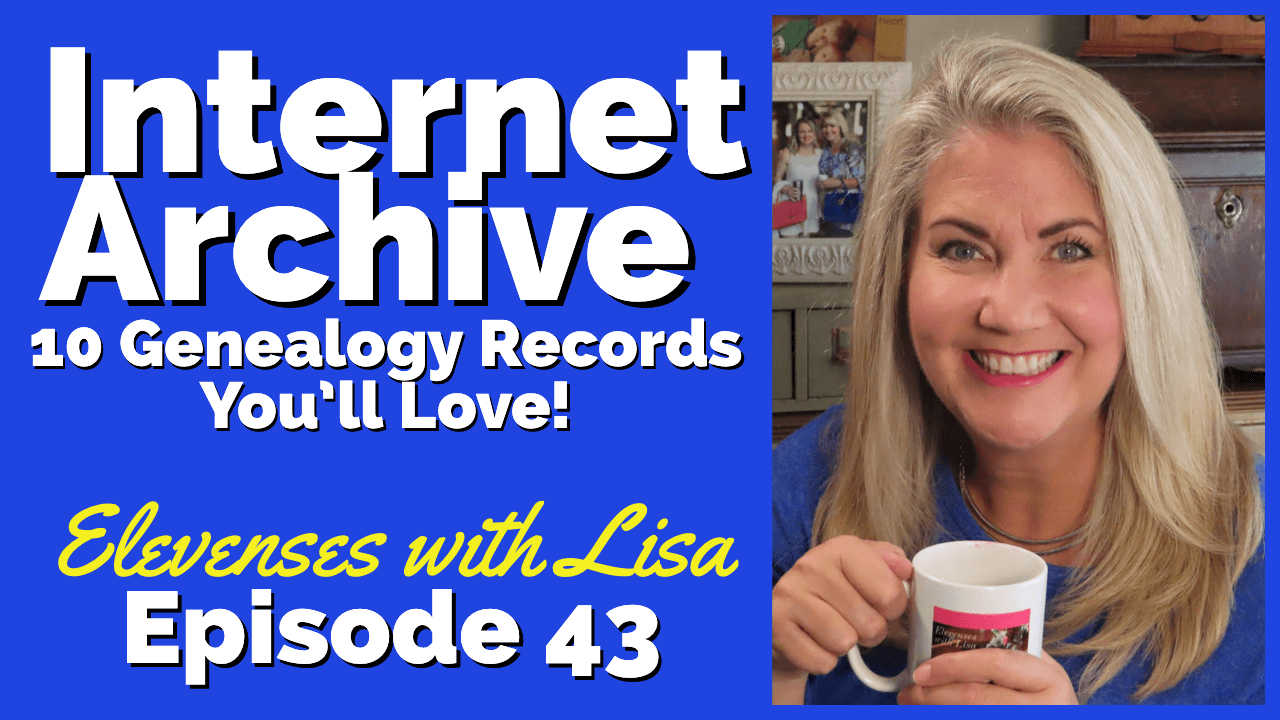Early Virginia Genealogy
Show Notes: Learn how to trace your ancestors back to Virginia just prior to the Revolutionary War. Professional genealogist Jeri Satterwhite-Dearing specializes in early Virginia research in her work as a professional genealogist with Legacy Tree Genealogists. She explains some of the biggest challenges you’ll face when researching early Virginian ancestors, the records you should be looking for, and some of the best resources.
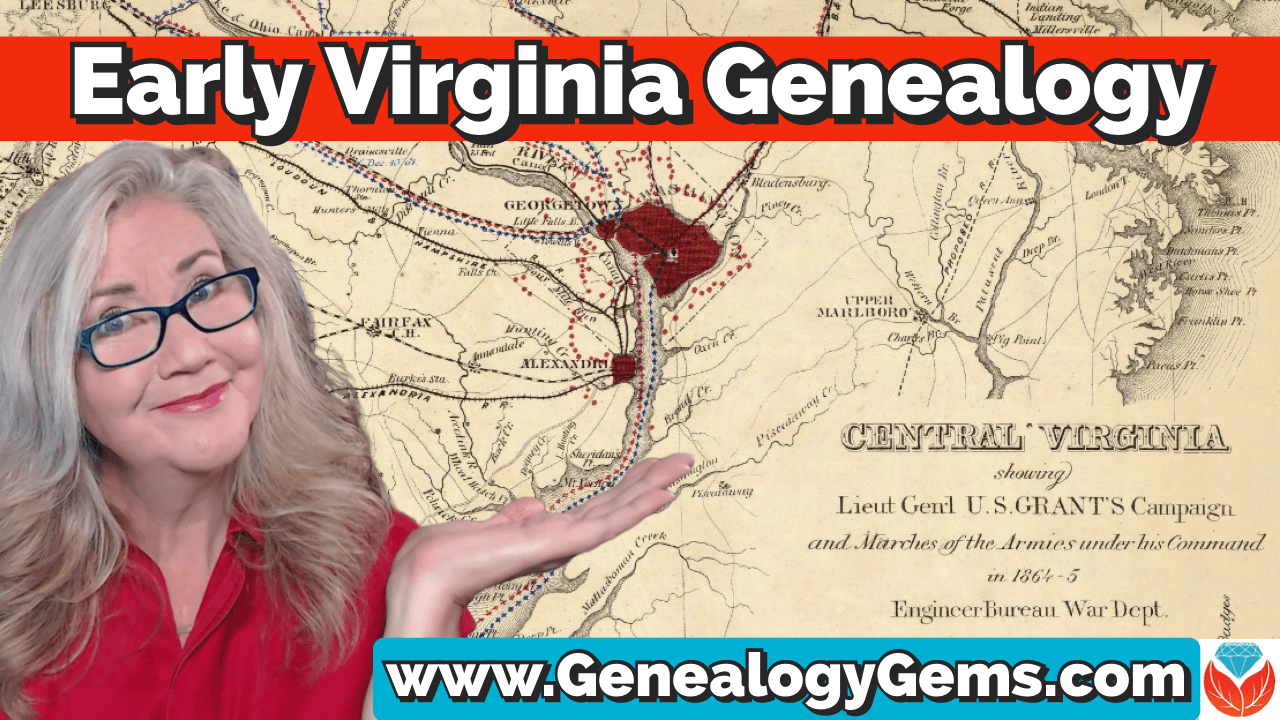
Early Virginia Genealogy Video and show notes
Watch the Video
Resource
Download the ad-free show notes including a BONUS Virginia checklist cheat sheet. (Premium Membership required)
Show Notes
Lisa: A while back, we did a video on Finding early American Ancestors in New England and we got tons of comments on it. We also received a lot of requests to dig into early American genealogical research. In this video and article, we are going to do just that for Virginia.
Guest: Jeri Satterwhite-Deering, professional genealogist at Legacy Tree Genealogists.
Exclusive Discounts
Learn more at https://www.legacytree.com/GenealogyGems This is our affiliate link and includes special discount coupon codes just for you.
Virginia Genealogy Research Challenges
What are some of the unique challenges that face people who are trying to research ancestors in Virginia?
Jeri: I think the main thing is that the further back you go, the different record types that you would expect to find and use. You won’t have census records before 1790, and you won’t necessarily have marriage records, or death certificates, because that didn’t come till much later. But those records are there, and then you just have to really know where to dig and what to look for.
I rely more on land records, tax records, court records, and those types of record. As I said, census records go back to 1790, maybe 1783, when they have county type census. Then at that point you need to rely on tax records more and look for your ancestors in land records. Land records are full of all kinds of genealogical clues about your family as you as you dig in deep.
Lisa: And it can be a bit of a challenge for folks who might be researching Virginia for the first time. We hear about things, like you mentioned the land records and tax records, and that could be very new territory for us. It can be a little intimidating to jump into a record collection you haven’t worked before.
Jeri: Right, especially because then you’re relying on original documents, which means reading the handwriting of the time. That takes practice. It’s like when you first learn to write cursive in school. It’s not that hard, it just takes a little bit of time. It’s kind of fun, because they write different, and their terminology is different. But that’s where your dictionary comes in. Practice makes perfect. The more you do, the easier it gets.
Most of those records are going to be at county level. If you have a burned county, then you may have to rely on state records. The Virginia state library may have more than what is left in a burned county. There are all kinds of records there. It’s just a matter of knowing where to go.
Learn More About the County in Virginia
My first recommendation would be to learn more about the county you’re going to be dealing with. First go to the FamilySearch Wiki for the county. Read what they have to say about which records are available for that particular county and start there. Make a research plan. Make notes and determine exactly what to look for.
I know that you’ve done a couple of past episodes, especially I think it was episode 64, where you talked about how to do research using FamilySearch. I think those are things you need to learn a little bit before you jump right in. I think that would be a really good start if they’re not familiar with FamilySearch. It’s one of the best places to go to look at records when you’re starting out.
Lisa: And it’s free, which is great.
Jeri: That’s right, so it’s definitely a good place to start along with learning about the county. Learning about the formation of the county, that’s almost a genealogical research adventure in itself because you need to know how the counties changed so quickly over time. And you do need to get back to what that parent county was. It’s important to know the genealogy of the counties and know where to look for those records, because they’re not all just going to be in today’s county. You may have to go back to multiple counties to find those records.
Lisa: Typically, when a record was created in a particular county, and then that county maybe splits out or changes we should be looking in the county that it was at the time our ancestors were there, right?
Jeri: Exactly. You might think, “that’s it, I’m done. I can’t find anything else.” When you feel that way, step back, review the various forms the county has taken. Check all of them. You’d be surprised where those records will be in many different places. They might even be in the courthouse basement. I’ve come across that many times as well.
In Virginia, not all deed records are going to be online. For example, here in North Carolina our counties have so many records available online. But in Virginia, they might not be on FamilySearch. You may have to go to a courthouse to actually see those records. However, they are getting better about getting them filmed.
If you’ve exhausted some of that, like I mentioned before, check out tax records. These put your person in their place in time, and that’s what you’re looking for. You always want to remember that a man by one name is not necessarily that man. Always remember that because there are so many same named people throughout history, and you have to be careful which one you’re chasing and get the right one.
Lisa: I love your idea about the genealogy of a county! Getting to know the history county at the same time as you’re getting to know the history of your family.
Virginia Burned Counties
You mentioned burned counties. Seasoned genealogists have heard that many times. But there are those who are new to genealogy, or they’ve been researching other parts of the country, and now they’re finding that their family line takes them into the South where burned counties are more common. Tell us a little bit about what you mean by a “burned county” and what does that mean to the records?
Jeri: Generally burned counties have a lot to do with war. That’s especially true during the Civil War. For the South, many courthouses burned down. But it happens even in today’s time. We see floods, we see fires. Again, look at your county history on the FamilySearch Wiki. It will tell you which counties were burned. Then you can determine where else to look for records.
I had a project recently that was in Washington County, Arkansas. The county was totally burned, and there was nothing really left. But at the state level, I was able to find the tax records. So, for the client’s ancestor, we were able to place him in that county in the time that we needed to place him there even though there was no information about him anywhere in the county. Those records were burned at two different times. Once in the 1800s, and then again later on.
When your ancestor got a deed, they would take it into the courthouse to get it recorded. This means that when you’re looking at a deed book, you’re not looking at the original record because they didn’t keep the original deed. They just recorded it, and then they handed it back. Folks then took it home to keep it in a safe place. I was very fortunate in one of my research projects that when we had burned counties, they had all the people bring their deeds back in and they recorded them again. And so that’s how we ended up with still having deeds that were probably burned the first go around in the clerk’s books.
I inherited deeds from my great grandmother that were in a trunk. That is probably what started this whole journey for me 30 years ago. One of the deeds was from 1812. It was just amazing! They had kept those deeds. The courthouse over in Orange County did not have that deed, so I took it over there, and they got to copy it into the deed book. And then they had it. There’s a lot of ways to get around the burned counties, and there’s reason for hope.
Lisa: That’s very encouraging that they brought records back in and entered them again.
State Level Records for Virginia
How do records end up at the state level? You mentioned a couple of times to check with the State Archives. Was there a process where every so often the counties were supposed to send copies of books to the state? Or did that happen much later?
Jeri: Well, I think it did, like, are in North Carolina, particularly. So many of our marriage records have gone to the state. So, they’re at our archives now. And so, they came out of the county’s hands, I don’t know, maybe because they just kept getting burned to the ground. They, and so they ended up, you know, at the at the state level at the State Archives for most of them. And so, your state archives is a good place for your research. State libraries are good, like the Library of Virginia (state library), as the just you couldn’t ask for better. And online and offline. It’s a great, it’s a great resource for learning and looking for records as well.
Important Types of Records for Early Virginia Genealogy
Lisa: You’ve mentioned a couple of different types of records. We talked about tax records. Would we find tax records for somebody who doesn’t own property?
Personal Property and Planned Tax Records
That would be your personal property tax records, and then you had planned tax records. So, there are two different ones and you want to look for each. There may only be just one white pole, which means that one person is over the right age to be taxable. It might be a horse, it might be a silver watch, things like that.
Land Tax Records
Then there’s the land tax where they’re going to tax you on how much property that you own.
Included in the property tax would be enslaved persons. So, if you’re doing African American research, especially for Virginia, these are helpful. If the person you are researching was an enslaver, they would have these people listed by their names, typically their first names because that’s generally all they had. Some of them were sorted out by age. Not necessarily every county would be the same. But you would have perhaps age under 15 or 16, and then over 16. And while that’s a broad range, you’re looking for every little thing you can when you’re doing that type of research. Those are the kinds of things that you would see in the tax records.
Chancery Records
Another great resource is chancery records, which I love. They’re court records which you can find at the Virginia Library. You can search by plaintiff or defendant or just a surname. I usually just do the surname when I search. You go to each county so choose your county, and then choose your name. It’ll bring up folders of court records. Everybody sued everybody just like they do now. Everybody was in court all the time. Sometimes it’ll just be maybe a lawsuit over land, or it could be a lawsuit over a horse or an enslaved person as well. But a lot of times you would find records that would involve state records, probate records, and every now and then you will really get lucky and you could find a whole family’s history in some of these files that explain the parents and the grandparents, the grandchildren. I’ve had them go many generations in one file and even include the neighbors. It puts your person in their place and time and helps you not confuse them with someone else
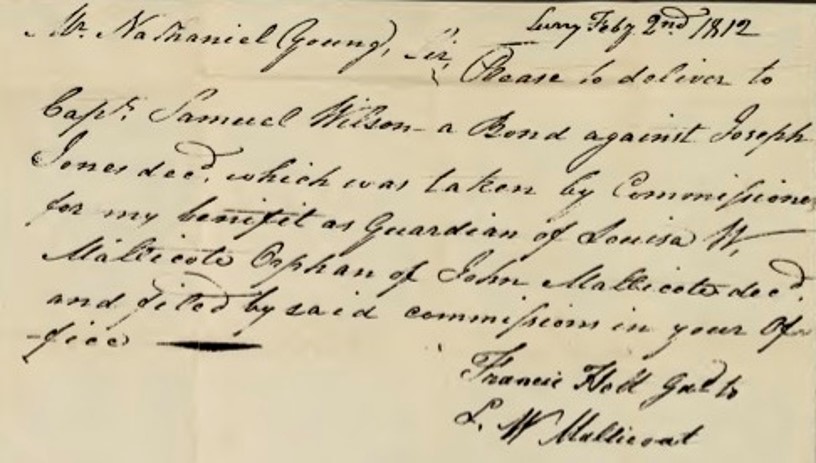
Virginia Chancery Record, courtesy of Jeri Satterwhite-Dearing
I would say that if you don’t look at those you’re missing out, totally! They are refilming a lot of the records right now. So, when you search your file might not come up. You would be able to see the file folder, but you might not be able to see the contents of it. But then you could take that information and go to your county level court records. Again, I would go through FamilySearch and do your search in the catalog by the county, not just a record search. By doing that, you can actually find those folders are still going to be within the county. You’ll have to dig a little deeper. But it’s always rewarding to do that.
Colonial Tithables
Lisa: You’ve mentioned several really important types of records, chancery court records, deeds, wills and estate records. What other types are there? You have on your list colonial tithables. What are those?
Jeri: Those were really early. They’re like taxing, and it has to do with who the person by the age, and if they’re old enough to be taxed. It’s another form of the tax record. Those are the really early lists that you would be back quite far. You might not need those for a while, but if you get lucky, and you’re really getting back pretty far, then those are good.
Understand Virginia Law
Lisa: I imagined to be able to really use these records, we have to really understand things like geography and the law. What are your recommendations to a genealogist on really getting to understand the law? What’s a good way to go about that?
Jeri: Reading, taking classes, I mean, there are so many classes available online nowadays, just from the comfort of your home to be able to learn a lot. That would be the best thing to get familiar with the law. Learning the law is a little bit more complex but it is important. For example, it helps you determine if someone would have been the right age to get married. It’s a good way to separate the person out that might be the same name. It would help you know if your ancestor was able to buy and sell land, whether they could be a witness, all those ages change frequently. Then you know whether to go look for those records.
Understand Virginia Geography
Lisa: Are there any other resources that you think should really be on the forefront of the minds of people who are going to be digging into their Virginia roots?
Jeri: Land and maps are really my favorite! The David Rumsey collection is free and it’s excellent. I think you did a video episode on finding and using David Rumsey maps, too. Oh, my gosh, it was great!
And I definitely look for maps with Google. (Resource: The Genealogist’s Google Toolbox by Lisa Louise Cooke.) You can Google historical maps for Roanoke County, Virginia, for example. Some of those older maps have the landowners on them. I’ve got a huge map collection. You can find them from the formation of the county. They will have the landowner’s names written where their land was. Maybe your person did not own land, maybe they were just tenant farmers, but you found the name of the landowner, or you find them in another record. Look to see who they were living around. You can then find where they were, when they were in that particular county. That also gives you a way to look for more records that might involve your ancestor, as well.
Lisa: Well, that makes great sense. Maps are such an important part of it’s all location and timeframe, right?
Jeri: Yeah, because everything was about land. It still is, but it always has been about the land, and you don’t want to bypass that. You don’t want to just look at census, marriage, and death records, and that’s it. You really need to understand the context of their life and everything that was going on around them in the area that they lived. You then know more about who they are. Say their name, know who they were, and make them come back. They can be alive.
Getting Help from a Professional Genealogist Specializing in Virginia
Lisa: That’s a great way to look at it. Jeri, if people get really stuck, and they just feel like I need help with a professional genealogist, how could they get in touch with you? And what do you guys do at Legacy tree genealogist?
Jeri: They can contact us, and we can steer them to the right professional genealogist for their project. We have a wonderful team, and they do really good work! If you get stuck or if you don’t feel like you have the years to go and take the time to take classes and do everything, come join us and we’ll be happy to get you on the right track and help you find your ancestors.
Exclusive Discounts: Learn more at https://www.legacytree.com/GenealogyGems This is our affiliate link and includes special discount coupon codes just for you.
Lisa: It’s a good feeling to be able to take a big leap forward and professionals can help you do it. Jeri, this has been terrific. Thank you for giving us a jumpstart into our Virginia genealogy.
(This interview was edited minimally for clarity.)
Resources
Download the ad-free show notes including a BONUS Virginia checklist cheat sheet. (Premium Membership required)
Video #4 of our 25 Websites for Genealogy – Digital Collections
VIDEO & SHOW NOTES: Video #4 of our 25 Websites for Genealogy Playlist. In this video, my guest presenter Gena Philibert-Ortega covers digital collection websites that are must-haves for family history research. You’ll find plenty of genealogy gems waiting for free at websites #18 through 22.
Websites 18 through 22 of our 25 Websites for Genealogy
Some of these websites will be new to you, and others are going to be very familiar to you. In talking about the familiar websites, I want to get you thinking about them differently, explain a little bit more about what you can do at these websites, and how to get the most out of them.
In this series of 25 Websites for Genealogy, we’re going to be looking at websites in different categories. Our third category is Digital Collection websites (#18 through 22).
Download the ad-free Show Notes cheat sheet for this video here. (Premium Membership required.)
Websites #18: Digital Public Library of America
At the DPLA you can search for public domain research materials that will benefit your genealogy research. It offers a searchable access to millions of items including photographs, manuscripts, books, sounds, moving images, and more from libraries, archives, and museums around the United States.

Use filters to refine your search at DPLA
Website #19: Google Books
According to Lisa Louise Cooke, Google Books is the tool you should use every day for genealogy. It puts 25 million digitized and searchable free books at your fingertips.
Learn much more about how to get the most out of Google Books with these videos by Lisa Louise Cooke:
- Google Books – Getting Started (Premium Membership required)

Log in to watch now
- Google Books – 10 Surprising Finds
- Google Books – New Features
Website #20: FamilySearch Digital Library
https://www.familysearch.org/library/books/
The FamilySearch Digital Library includes over 500,000 genealogy books, family histories, maps, yearbooks, and more.
Website #21: Internet Archive
If you’re looking for new information about your family history, an important website to add to your research list is the Internet Archive. It’s a free website that attempts to archive the web, and that includes a vast array of genealogy materials!
Visit the dedicated Genealogy Collection page: https://archive.org/details/genealogy&tab=about
Learn much more on how to find valuable genealogical records for free with this video by Lisa Louise Cooke: Internet Archive – 10 Records You’ll Love to Find
Website #22: HathiTrust
Founded in 2008, the non-profit HathiTrust provides access to 18+ million digitized items in the HathiTrust Digital Library. Reading access varies depending on the item and whether you belong to a participating organization, but it’s definitely worth a look.
Resources:
Download the ad-free Show Notes cheat sheet for this video here. (Premium Membership required.)
Not a Premium Member yet? Discover the benefits and join today.
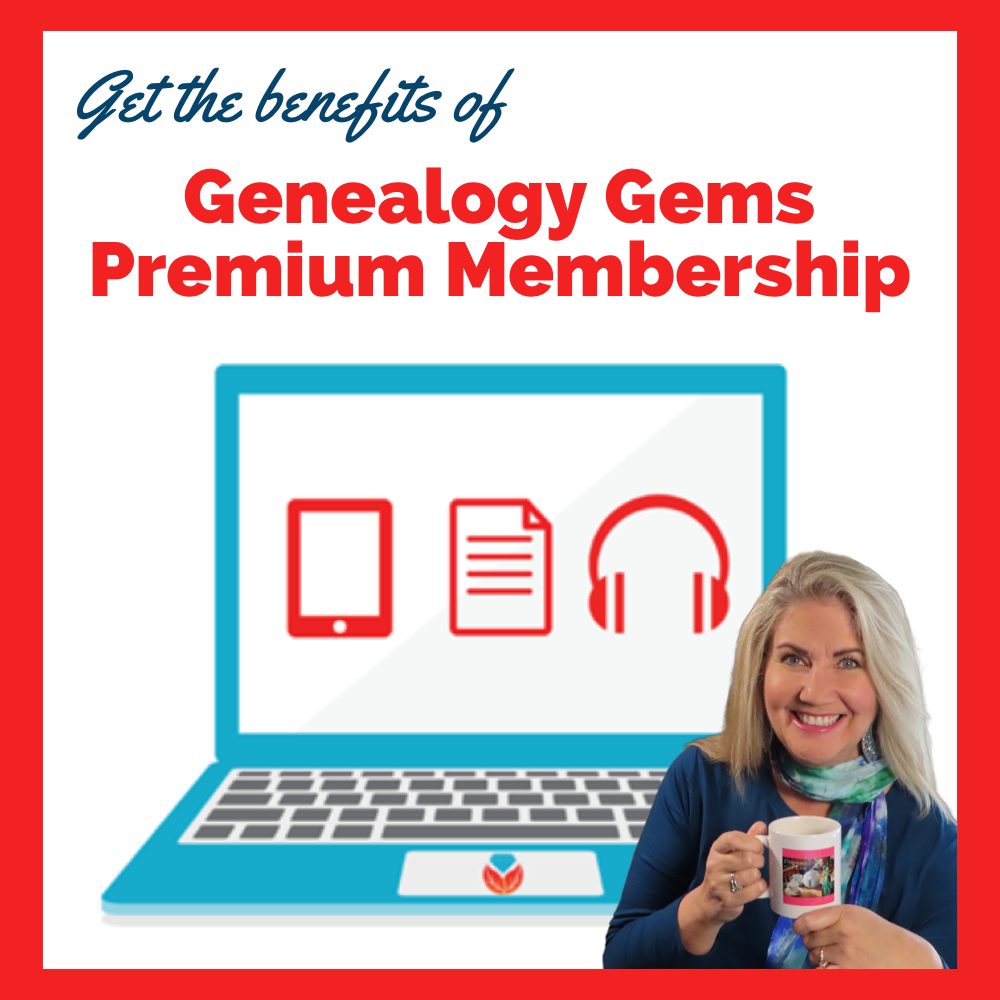
Click to learn more about Genealogy Gems Premium Membership.
A Call to Reopen the U.S. National Archives
Video and Show Notes
On their website, the U.S. National Archives states their mission is to: “provide public access to Federal Government records in our custody and control. Public access to government records strengthens democracy by allowing Americans to claim their rights of citizenship, hold their government accountable, and understand their history so they can participate more effectively in their government.” (Source: https://www.archives.gov/about/history/about/history/history-and-mission)
Shockingly, as of February 2022 the archives has not been fulfilling that mission for nearly two years! (Source: Visit each facility web page listed at https://www.archives.gov/locations)
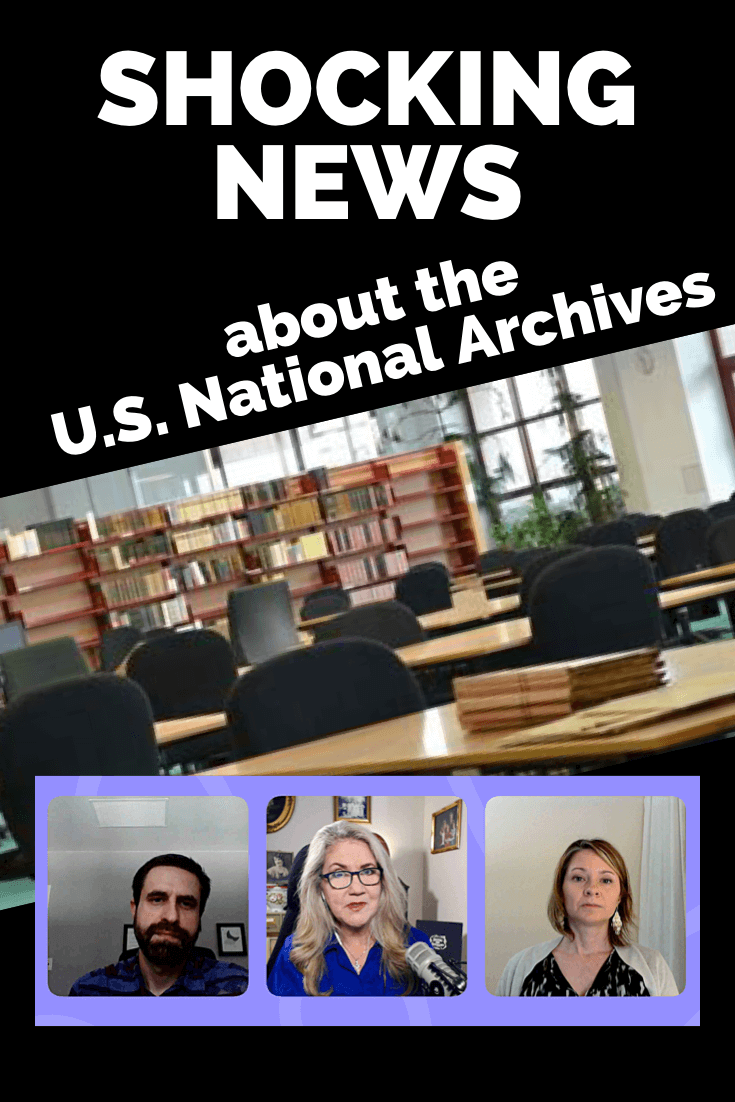
Please share and help get the word out.
My guests Geoff Gentilini, President of the Archival Researchers Association, and Jessica Taylor president of the international genealogy research firm, Legacy Tree Genealogists explain:
- more about the situation,
- its far-reaching impact,
- and what you can do to help.
Please make time to watch this important video and support the genealogy community! Sign the Petition: Two Years is Too Long: Reopen National Archives Research Rooms
Watch the Video
Having trouble viewing the live video or video replay? Try refreshing this page in your web browser.
Show Notes
(Premium Members: Log in and download the ad-free show notes handout.)
Geoff Gentilini is the president of the Archival Researchers Association. He is a professional researcher specializing in military records, individual veteran searches, unit histories, and family history research. He is the owner and project manager of Golden Arrow Research. In 2011, Geoff devised a unique process to rebuild the service histories of individual WWI, WW2 & Korean War veterans whose personnel records were lost in the 1973 archives fire. His work has enabled thousands of descendants to gain a better understanding of their ancestors’ military service. He is the president of the Archival Researchers Association, an organization that has been instrumental in advocating (to Congress) for an increase in the budget of the National Archives.
Jessica M. Taylor serves as president of international genealogy research firm, Legacy Tree Genealogists, and as a board member for the Association of Professional Genealogists, the Genealogy Business Alliance, and the Association of Genealogy Educators and Schools. With a degree in Family History – Genealogy and over 20 years of experience, Jessica loves contributing to the genealogy community and pushing the industry forward to better help others discover their roots.
The Scope of the Records at the National Archives
Lisa: Can you give our audience a quick overview of the scope of the records that are housed at the National Archives?
Geoff: There are about 46 facilities, including 15, presidential libraries, 14 archives, 17, federal record centers, and these are spread out across the country. They contain more than 13 billion textual records, 20 million photographs, 40 million aerial images, there’s 75,000 miles of film. These records tell our national story. The holdings are massive.
Today, something like 1% of this material is online. Researchers access the other 99% of these records in our nation’s public research rooms, which are scattered across the country.
I think the National Archives has the goal of digitizing somewhere near 3% of these records by the year 2024. But as we all know, just because something is digitized, that doesn’t necessarily mean that it’s going to be online or usable for research.
Jessica: The first time he said, you know, 99% of the records are digitized, I said “no way, there’s no way that that could be true.” So he sent me information that’s put up by the archives, and I did the math. And I said, “Holy cow, you know, it’s absolutely true.” There are records there that you can’t get any other way, besides going in person to get those records.
Research Rooms
Lisa: I did an entire hour show on the National Archives website last year, and it got on my radar as well, that as wonderful as the site is, and it’s got some access to some things, it’s such a tiny fraction! This means there’s a treasure trove remaining, but you have to access it in person.
(How to Search the U.S. National Archives Online Catalog for Genealogy with Lisa Louise Cooke.)
Jessica, that leads us to the research rooms because that’s where we gain access to the records. What and where are the research rooms? And who uses them?
Researchers
Jessica: There are 14 National Archives research rooms spread around the country. Washington, DC has a major one. There’s one nearby in College Park, Texas, a few on the West Coast, one in Missouri. So they’re spread out throughout the country.
Each one of these research rooms has different records. So, like we said, they’re all paper still, and in different facilities. If you want a certain type of record, you have to go to that facility to get it.
The people who use these research rooms are obviously genealogists, that’s my primary interest in them, historians, authors, filmmakers, and lots of use for veterans. There are educators, students, I mean, there are so many groups who need these records and have been on hold.
I have a friend who is working on a book that she’s had to put on hold for two years because she needs the information that’s in one of the archives. She can’t complete the book until the archives opens.
The Impact of the Research Rooms Closures
Lisa: Geoff, I know that you work a lot at the National Archives in St. Louis, can you explain to our audience the significance of that particular location, and its closure, and particularly on veterans? How are they affected?
Geoff: The Research Room in St. Louis is really special because it contains the personnel records and military records that tell the story of the men and women who served in the armed forces. These are records from World War I, World War II, the Korean War all the way up through Vietnam, and later.
Many living veterans and veterans’ advocates rely on researchers to work on these more complex research cases. They help to reverse denied benefits claims in many cases. This type of work has been stalled for two years!
From the historical record side of things, this is the work that I used to do primarily in St. Louis. I would rebuild the service histories, the individuals whose records were lost in the 1973 fire, primarily veterans of World War II but also World War I, and the Korean War. Families who really knew nothing about their loved ones service could gain closure by understanding their contribution to the war effort.
This research in St. Louis also helps to do things like correct grave markers for veterans and locate the remains of fallen soldiers who were lost on the battlefield.
At this point, there hasn’t even been a minimal reopening in St. Louis, the way that there was at some other research locations.
Lisa: You’re talking about veteran records. I imagine that people are trying to verify benefits. Don’t you guys work with people who volunteer to help veterans get the records they need so that they can apply for their benefits or is that stalled?
Geoff: Yeah. There is a massive backlog right now of requests that come in from veterans and their families for DD 214 records. These are like the military discharges that you can use to when you’re seeking benefits to get a home loan and things like that. What has happened is that the historical research portion of the archives there has not been reopened, because of that enormous backlog. But at this point, it’s been two years, and they’ve sort of locked the doors. But that that backlog is still growing. The St. Louis Research Room is also a smaller Research Room, and we believe it can be reopened by leaving a smaller footprint.
Lisa: Jessica, can you give us a sense of the financial impact of these closings on the people who rely on access to the research rooms for their work?
Jessica: When when COVID first hit in 2020, and they were closed, that’s the time period when I got in contact with Geoff. What drew me to trying to help his organization initially was people like Geoff who are completely out of work. Their businesses revolve around access to archives, to the National Archives, to specific facilities in specific regions. And so, I thought, wow, I’ve got to help them be able to work again, right?
So we’ve tried and now two years have gone by, and I just can’t imagine how these people are faring. Because they’ve been out of work for two years. I just talked with somebody on LinkedIn who reached out about this petition, and he was so thankful that we have this petition and said, “Well, I’ve been so frustrated. I was actually told, you know, shame on me for building my business model around relying on the National Archives.” And I thought wow, how sad that we can’t rely on the National Archives to open. It just hurts my heart. I mean, beyond that, there is this author I mentioned who is trying to finish her book can’t finish it. It’s been two years!
And of course, we have many clients who have ordered genealogical research that we can’t finish. Many have asked for refunds, because two years is a long time to wait for something like this. So unfortunately, it definitely has had an impact in the genealogy industry and other industries as well.
Geoff: The work that we do is important work. It’s specialized skills, too. And after two years, we’re starting to see our colleagues quit and move on to other things, because how long can you sustain yourself without being able to access these records that enable you to do your job? So that that’s something else too. It’s a loss for the public. We’re losing the expertise and the people that help to tell these stories by accessing these records.
Will the National Archives Reopen?
Lisa: Let’s talk about the reopening because right now, we’ve looked at two full years of closure and lack of access. I was doing some research in anticipation of getting together and talking today and I was looking at what the National Archives is saying about their policy and what they call high, medium and low risk. Even if the risk is considered low, they’re not saying full reopening. They’re talking about appointments and screenings and things.
I know that David S. Ferriero, Archivist of the United States, put out a letter, the most recent one I could find was November 8 of 2021. He says “at low transmission level staff will be on site to complete all types of work, and research rooms are expected to remain open by appointment only.”
Geoff, does that sound like an organization that’s planning on and anxious to get back to full time access?
Geoff: Yes, well, it certainly sounds like a difficult system for someone who would need to be able to do their job five days a week and get in there and really access these records in the way that we need to, to do our jobs. We really are trying to look past that. The restrictions, until we can get back to a level of normalcy, at least in the level of access to records, the sliding scale system with the case rates, and how they open and close. This appears to be how the federal government has structured things for the agencies that fall underneath of the executive branch, the IRS, and the Social Security Administration. Some of this is out of the hands of the archives management.
Other things we think they might be able to do when they do open to kind of prioritize the research rooms and get them back to functioning at pre pandemic levels. That’s really what we’re seeking. We kind of feel like where there’s a will there’s a way. And when 99% of the records that you work with are physical, it really demands that you have the staff and be open to meet that public demand.
Lisa: I noticed on the petition website, which we are going to talk about, there is a way that our viewers can help try to get the message forward to those in power to make a different decision and maybe open this up.
One of the things that’s interesting is that the museum in the Washington DC area is open. It’s in the same building as the research rooms, and those are closed.
Geoff, have they told you anything about ‘here’s the mark, here’s the goalpost? When this happens, we will welcome you all back.’ Do you have any sense of what that place is?
Geoff: I think that the pandemic has been so unpredictable that no one is willing to make any type of you know, there’s no clarity. Everyone is sort of seeking cover. And in this hyper partisan environment that we live in today, nobody’s willing to kind of stick their neck out and say, ‘Well, this is what we’re going to do to take initiative, be imaginative.’ And that’s really what we need so that we can function in a type of new normal when it comes to research.
We know that we’ve got vaccines – 95% of the federal workforce is vaccinated. I believe that you have to either show proof of vaccination status to get inside of the archives or show that you’ve had a negative test. And then of course, you’re required to wear a mask. So, there are things in place to make sure that we have a safe environment when we’re researching. So, the public is safe, and the staff are safe. We just need to figure out how to get back to pre-pandemic levels of access, even if we do have some new restrictions in place, like masks or vaccines or things like that.
Jessica: Geoff mentioned to access the archives, showing that you’re vaccinated, using a mask. So that was in place during the couple of weeks that two of the archives were actually opened in November. We had two archives opened for a couple of weeks, in November. And we did follow all of those protocols. However, they were closed, and the other facilities around the country have never opened since March 2020.
Lisa: And of course, since then, with the coming up Omicron, we know that the vaccinated get ill just like the unvaccinated. So, you’re right, it keeps changing and keeps moving. And that’s where the lack of the goalpost is kind of a challenge.
Let’s talk about some of the ways you’re trying to communicate with the National Archives to see what could be resolved so that everybody feels good about what’s happening and can participate and get what they need.
How You Can Make a Difference in the Reopening
Jessica, you’ve put a petition together. This is what first came to my attention. Tell us about what that is and what your goals are.
Jessica: Absolutely. A main goal that I have with this petition is I just thought ‘I can’t let over two years go by with these important archives being closed, and the leaders of the archives not receive a united strong message from our communities that we care about this, and that it affects us.’ So a major goal is I just want to be able to show them how many people care that they’re closed, especially because it affects us not only now, but genealogists and historians have a long history of having to fight for public access to records.
I don’t want those leaders to look back on this event, years into the future and think ‘well, nobody really seemed to mind that they couldn’t access those records.’ I want them to know that many, many thousands of people cared that they couldn’t access the records.
The ask of this petition is that they reopen by sometime in March 2022. That will be a full two years that many of these facilities have been closed. We’ve seen many other events and businesses and groups have been able to safely reopen, I think that the National Archives is capable of doing the same. I think that it’s important that we ask for that strongly and in the united fashion.
The petition is at https://change.org/reopen archives. We want thousands of signatures. We have about 3000. We’d like to at least double that. We want them to know that these archives matter to the citizens of the United States and the world.
The Petition: Two Years is Too Long: Reopen National Archives Research Rooms
Lisa: I wholeheartedly agree. And I know you’ve just had it up a couple of days, and that’s an amazing start right out of the gate.
As you said, there’s a lot of different players involved who make the decisions, but it’s so important that we make our voice known and our needs known because how else would they incorporate that into the decision-making?
Anything else Geoff that you want to mention about this and things that you would encourage people to do?
Geoff: Something else folks might think about doing is reaching out to your house representative to your senators and just letting them know that you care about this issue that you want to see the archives open all the research rooms back open again. Citizens need and deserve access to government records. That’s the archives mission.
Lisa: it certainly is, and I really appreciate and respect that the two of you have taken some action and made your voices known and hopefully we will ask everybody here watching to help do the same.
Jessica: And please share, you share it, sign it and also share!
Lisa: Yes, That’s the best way to get the word out. Everybody knows another genealogist!
Resources
Premium Members: Log in and download the ad-free show notes handout.



